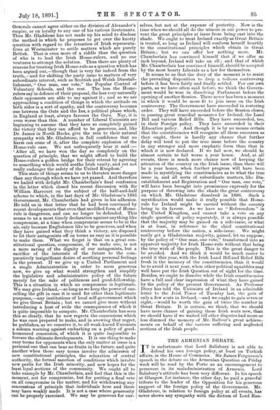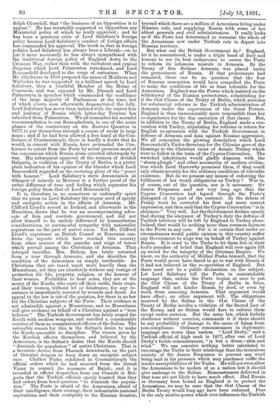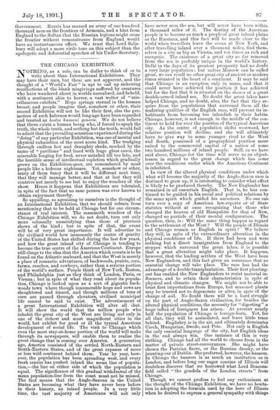THE ARMENIAN DEBATE.
IT is unfortunate that Lord Salisbury is not able to defend his own foreign policy, at least on Turkish affairs, in the House of Commons. Sir James Fergusson's speech in the debate on the Armenian Question on Friday week will be read by the Porte as an encouragement to persevere in its maladministration of Armenia. Lord Salisbury's attitude has been very different. In his speech at Glasgow, for instance, the other day, he paid a graceful tribute to the leader of the Opposition for his generous support of the foreign policy of the Government. Mr. Gladstone, in relation to foreign policy at all events, has never shown any sympathy with the dictum of Lord Ran- dolph Churchill, that "the business of an Opposition is to oppose." He has invariably supported in Opposition any Ministerial policy of which he really approved ; and he has been a generous critic of Lord Salisbury's foreign policy because Lord Salisbury's conduct of foreign affairs has commanded his approval. The truth is, that in foreign politics Lord Salisbury has always been a Liberal,—or, to put it more accurately, he has always sympathised with the traditional foreign policy of England down to the Crimean War, rather than with the turbulent and cynical Jingoism which Lord Palmerston introduced, and Lord Beaconsfield developed to the verge of caricature. When Mr. Gladstone in 1858 proposed the union of Moldavia and Wallachia he was supported in a brilliant speech by Lord Salisbury, then a youthful Member of the House of Commons, and was opposed by Mr. Disraeli and Lord Palmerston in speeches which commanded the confidence of the large majority of Parliament at the time, but of which events soon afterwards demonstrated the folly. Lord Salisbury has never been imbued with the craven fear and jealousy of Russia which latter-day Toryism has inherited from Palmerston. We all remember his scornful recommendation to our Russophobists, in one of the acute phases of the controversy on the Eastern Question in 1877, to put themselves through a course of study in large maps ; and if he had been allowed a free hand at the Con- ference of Constantinople, there is hardly a doubt that he would, in concert with Russia, have persuaded the Con- ference to extort from the Porte by moral pressure most of the concessions which Russia alone extorted afterwards by war. His subsequent approval of the reunion of divided Bulgaria, in violation of the Treaty of Berlin, is a pretty plain indication of his opinion of the blunder which Lord Beaconsfield regarded as the crowning glory of the " peace with honour." Lord Salisbury's stern denunciation at Glasgow of misrule in Morocco is a further proof of the entire difference of tone and feeling which separates his foreign policy from that of Lord Beaconsfield. It is, therefore, in no censorious or unfriendly spirit that we press on Lord Salisbury the urgent need of speedy and energetic action in the affairs of Armenia. Mr. Clifford Lloyd's record in Ireland, and afterwards in the Mauritius, shows that he was an uncompromising advo- cate of firm and resolute government, and did not allow himself to be unduly influenced by humanitarian considerations, or sentimental sympathy with nationalist aspirations on the part of native races. Yet Mr. Clifford Lloyd'S experience as British Consul at Erzeroum con- firms the reports which have reached this country from other sources of the anarchy and reign of terror which prevail among the Christians of Armenia. That intrepid traveller, Mrs. Bishop, has lately returned from a tour through Armenia, and she describes the condition of the Armenians as simply intolerable. As Christians they are taxed much more heavily than the Mhssulman, yet they are absolutely without any vestige of protection for life, property, religion, or the honour of their women. Forbidden to bear arms, they are at the mercy of the Kurds, who carry off their cattle, their crops, and'their women, without let or hindrance, for any re- sistance is immediately resented by wounds and death. An appeal to the law is out of the question, for there is no law for the Christian subjects of the Porte. Their evidence is not. admissible against_a Mussulman, and no Mussulman will give evidence on behalf of a Christian against a " true believer." The Turkish Government has lately armed the Kurds with modern weapons, and enrolled a considerable number of them as commissioned officers of the Sultan. The ostensible reason for this is the Sultan's desire to make the Kurds amenable to discipline. The reason given by the Kurdish officers themselves, and believed by the Armenians, is the Sultan's desire that the Kurds should " diminish the population " of native Christians. That is a favourite device, from Pharaoh downwards, on the part of Oriental despots to keep down an energetic subject race. Chef ket Pasha exhibited in Constantinople the official orders which he had received from the Grand Vizier to commit the massacre of Batak ; and it is recorded in official despatches from our Consuls in Bul- garia that the Turkish officials openly boasted that they had orders from head-quarters " to diminish the popula- tion." The Porte is afraid of the Armenians, afraid of their intelligence, their courage, their indomitable national aspirations, and their contiguity to the Russian frontier, beyond which there are a million of Armenians living under Russian rule, and supplying Russia with some of her ablest generals and civil administrators. It really looks as if the Porte had determined to terrorise the whole of the Armenians now under Turkish rule to depart into Russian territory.
But what can the British Government do ? England, let it be remembered, is under a triple bond of duty and honour to use its best endeavours to coerce the Porte to reform its infamous ' misrule in Armenia. By the Treaty of San Stefano Armenia was placed under the protectorate of Russia. If that protectorate had remained, there can be no question that the fear of Russian annexation would have compelled the Porte to make the conditions of life at least tolerable for the Armenians. England was the Power which insisted on the withdrawal of the Russian protectorate, substituting for it the 61st Clause of the Treaty of Berlin, which provides for substantial reforms in the Turkish administration of Armenia under the supervision of the Great Powers. England is thus immeasurably more responsible than her co-signatories for the due execution of that clause. But, in addition to the Treaty of Berlin, England made a con- vention with Turkey, stipulating for reforms in return for English co-operation with the Turkish Government in defence of Armenia and Asia against Russian aggression. We all remember the glowing description which Lord Beaconsfield's Under-Secretary for the Colonies gave of the blessings to the Christian races of Asiatic Turkey which were to follow in the train of the Cyprus Convention. The wretched inhabitants would gladly dispense with the " steam-plough " and other accessories of modern civilisa- tion which Lord Harrowby promised them, if they could only obtain security for the ordinary conditions of tolerable existence. But do we possess any means of enforcing the fulfilment of her treaty obligations on Turkey ? War is, of course, out of the question, nor is it necessary. Sir James Fergusson said not very long ago that the Cyprus Convention had lapsed through the Porte's disregard of its part of the contract. In the debate of Friday week he corrected his first and more correct impression, and then said that the Cyprus Convention " is in abeyance." Very well. Let the Government declare openly that during the abeyance of Turkey's duty the defence of Turkish territory will be left by England to Turkey alone. Indeed, that would be nothing more than common fairness to the Porte in any case. For it is certain that under no circumstances would public opinion in this country suffer any Government to wage war on behalf of Turkey against Russia. It is cruel to the Turks to let them live in their fool's paradise of belief that England mill ever again lift up sword for the integrity of the Ottoman Empire. We know, on the authority of Midhat Pasha himself, that the Porte would never have dared to go to war with Russia if it had not believed in the co-operation of England. But there need not be a public declaration on the subject. Let Lord Salisbury tell the Porte in unmistakable language that, unless the. Porte begins at once to put the 61st Clause of the Treaty of Berlin in force, England will not hinder Russia by deed, or even by word, from annexing Armenia. That argument would have effect ; no other argument will. The obligations incurred by the. Sultan in the 61st Clause of the Treaty of Berlin involve a violation of the Sacred Law of the Koran, and no Sultan would dare to enforce them except under coercion. But the same law, which forbids obedience without coercion, commands it if there should be any probability of damage to the cause of Islam from non-compliance. Ordinary remonstrances in diplomatic language are worse than useless. "Lord Derby," said a Turkish official of high rank in 1877, after one of Lord Derby's feeble remonstrances, " is but a drum—skin and wind." We can conceive nothing better calculated to encourage the Turks in their misdoings than the tremulous anxiety of Sir James Fergusson to prevent any word being said in his presence which may perchance ruffle the tender susceptibilities of the Turks. He will not evenallow the Armenians to be spoken of as a nation lest it should give umbrage to the Sultan. Remonstrances delivered in that tone are not likely to have much effect. Had Russia or Germany been bound as England is to protect the Armenians, we may be sure that the 61st Clause of the Berlin Treaty would long ago have been enforced. Fear is the only motive-power which ever influences the Turkish Government. Russia has massed an army of one hundred thousand men on the frontiers of Armenia, and a hint from England. to the Sultan that the Russian legions might cross the frontier without remonstrance from England would have an instantaneous effect. We trust that Lord Salis- bury will adopt a more virile tone on this subject than the apologetic and deferential speeches of his Under-Secretary.




















































 Previous page
Previous page